
The Nelson AI Sandbox is making waves!
Media outlets have taken notice of how The Nelson AI Sandbox builds community capacity to use AI effectively and ethically. We’re excited to share that The Listener, one of New Zealand’s most widely read magazines, recently featured our work in Nelson in a dedicated column! It’s a great reflection of the impact we’re making, and we’re honoured to be recognised in such a respected publication. You can subscribe to The Listener and read the full article through this link.
Here are some of the quotes from the article:
Who we have reached and who is involved
“In just over 12 months, the team of volunteers and one paid staff member (a part-time position was recently added) have helped about 12,000 locals get a grasp of AI’s capabilities. They range from primary school kids to octogenarians.”
Then-minister of science, innovation and technology Judith Collins gave her thoughts:
“I’m really grateful you are demystifying, bringing it down to earth and providing practical solutions for people”.
Innovation Capital
“Our heritage is intellectual capital and I believe [Nelson] could be a leader again by creating good healthy uses of AI that increase prosperity, equitability and livability, and help build a sustainable economy.”
Future Thoughts
“Nelson’s AI Sandbox could be used as a blueprint to help other New Zealand towns and cities accomplish similar goals. These things are never a one-person effort. though; it definitely takes a team to make it happen.”

AI for all in Nelson
In a corner of the library a quiet artificial intelligence revolution is taking place. Charles Anderson talks to the founder of Nelson AI Sandbox, who believes the city could become a thriving hub for AI.
Wander into the Elma Turner Library, turn right and sit down at a table. Maybe you have a problem. Maybe you have ordered a cross-stitch pattern off the internet but you don’t speak the German that the instructions are in. Maybe you are trying to book a holiday but can’t bring yourself to navigate the myriad tourism sites spouting all kinds of brain-numbing deals. Or maybe you have returned from holiday with thousands of photos and want to help organise them into something that makes more sense.
These are all examples of the problems that the Nelson AI Sandbox has helped solve for ordinary Nelsonians. While these might seem like innocuous issues, the vision for the project is much grander. It sees Nelson as an artificial intelligence hub where people across the city, regardless of their background, can thrive in the ever-evolving digital age. It elevates the companies that now exist there which are all leveraging AI to create economic growth. Combined, it hopes to create a more equitable city where all can use the transformative power of AI to benefit lives.
And this corner of the library has a part to play in that. It is the brainchild of Richard Brudvik-Lindner. His creation, the Nelson AI Sandbox, stands as a testament to his commitment to democratising artificial intelligence, fostering a community where knowledge and innovation converge.
Richard’s journey is a rich tapestry woven from a diverse array of experiences. His background, spanning philosophy, journalism, pivotal roles within technology giants like Microsoft and Sega, and now as a teacher at Nelson College, has provided him with a unique perspective on the power and potential pitfalls of technological advancement.
“I’ve seen how technology can transform industries and societies,” he says. “But I’ve also seen how it can exacerbate existing inequalities. That’s why I believe in democratising access to these tools, ensuring they serve the entire community.”
This awareness fuelled his passion for education, particularly his work in teaching social studies. “I wanted to equip my students with the critical thinking skills to navigate a world increasingly shaped by technology,” he explains. “It’s not enough to simply use these tools; we must understand their implications and ensure they serve the greater good.”
His approach in the classroom, fostering critical thinking about the societal impacts of AI, laid the groundwork for his future work with the Sandbox.
In a corner of the library, a quiet artificial intelligence revolution is taking place. Charles Anderson talks to the founder of Nelson AI Sandbox, who believes the city could become a thriving hub for AI.
The seed for the Nelson AI Sandbox was planted with the Whakatū Intellectual Capital Kohanga (WICK), an organisation dedicated to cultivating Nelson’s knowledge economy, especially after the ambitious Nelson library redevelopment was announced. When this project faced delays and then a total rethinking, Richard seized the opportunity to address the burgeoning interest in AI, sparked by the advent of ChatGPT.
“We asked, ‘Could we do something as a demonstration project for what a 21st-century library could be?’” he recalls. “Something that would be more than just a building, but a dynamic space for learning and innovation, a true community hub.”
The vision shifted from a library space to something else. “It was always about how can we be of service to the community through this?”
He draws the analogy to the electrification of communities, noting that those who embraced the technology early reaped significant benefits. He envisions AI as the new frontier, a catalyst for building capacity and strengthening Nelson’s social fabric.
“It’s kind of like, you know, going back to the time when electricity was moved,” he says. “And the communities that sort of latched on to that early were the ones that arrived at some additional prosperity. We want that for Nelson with AI.”
The Sandbox emerged as an inviting, unintimidating space—a “living room” for AI exploration. Located in a storefront on Trafalgar Street, it aimed to help revitalise Nelson’s CBD, attracting diverse demographics and fostering a vibrant community.
Richard’s aspiration to eventually keep the Sandbox open from 11 am to 2 am, seven days a week, underscores his commitment to creating a hub for the tech-savvy and community builders alike. “A lot of those guys are night owls, and so, you know, trying to have a space where that community could go and build that community, and interact with each other, and then every time they do that, of course, that also is potentially a building block for the economy.”
To bring his vision to life, Richard assembled a team of experts, including Julian Maclaren and Mark Houghton Brown from the Nelson AI Institute, Matthew Kidson, Richard Butler of BlueberryIT, and Gisela Carr. Each contributed unique expertise and resources.
“We really want to strengthen the social fabric,” he says. “Build capacity in our community, so AI benefits everyone, not just a select few.”
Richard envisions AI as a tool to bridge the digital divide and create a more prosperous and inclusive society. “Any time you have prosperity, if it’s, you know, fairly shared around, somewhat evenly distributed, it becomes a healthier society,” he says. “And that strengthens the social fabric. We see AI as a way to create that shared prosperity.”
The Sandbox’s initiatives—curated streams, hands-on workshops, public lectures, and tailored familiarisation sessions—are designed to demystify AI and make it accessible to everyone. “We try to figure out where they’re at just in time, in terms of, like, their temperature on AI,” Richard says. “And then from there, our point of departure, for most people, is like finding out what’s going on in their life.”
From helping retirees manage digital photos to assisting local businesses with AI integration, the Sandbox offers personalised guidance, ensuring everyone feels comfortable exploring AI’s potential.
The impact of the Sandbox extends beyond individual learning. It has become a catalyst for innovation, fostering a vibrant ecosystem of AI-driven businesses. Local companies like Teachplus.ai, which is revolutionising educational tools, and VoiceAI NZ, exploring voice-driven AI solutions, are thriving. SnapCORE optimises digital content, while Apply AI streamlines recruitment. AI Factory develops diverse AI tools, and established players like Shuttlerock integrate AI into their global mobile video advertising.
The Nelson AI Institute is a key collaborator, providing crucial expertise and resources. The Sandbox has also created two local startups through its volunteer programme.
Richard’s teaching background has made him acutely aware of the digital divide. “As a teacher, I see in my classroom all the time the chasm that exists between the haves and the have-nots, the technology phobic and the technology friendly,” he says. “And so, you know, trying to lessen that divide and to make everyone feel like they can live in this world in a way that’s happy and productive. That’s what the Sandbox is about.”
He is particularly passionate about the ethical implications of AI. “AI is a powerful tool, but it’s essential that we use it responsibly,” he says. “We need to ensure that AI systems are fair, unbiased, and respectful of human rights. We’re not just about tech; we’re about ethical tech.”
He recognises that as AI becomes more integrated into daily life, it’s crucial to cultivate a responsible and inclusive approach.
Richard emphasises the need for an informed approach to AI. “We’re not here to evangelise AI,” he says. “We know that it has bad uses. We know that there are bad actors out there.”
This awareness underscores the Sandbox’s commitment to fostering ethical AI practices within the Nelson community. He understands that the potential for misuse exists, particularly in areas like data privacy, algorithmic bias, and the spread of misinformation. Therefore, the Sandbox actively engages in discussions and workshops that explore these ethical dilemmas, aiming to equip individuals and businesses with the knowledge to navigate them responsibly.
“All we can do is we can try to amplify the good uses,” Richard explains. “And that’s what we’re trying to do through the AI Sandbox—democratising this technology, giving people a sense that it doesn’t have to control them. They can control it. And then helping them to maximise the good uses of it.”
Richard’s vision extends to AI adaptation counselling and coaching sessions, preparing Nelsonians for a future where AI is deeply integrated into daily life. “How do we help people to adapt to that world?” he asks. “And that might mean some coaching. You try this and that. And so, counselling in the non-psychological way, but, you know, just helping them to think through other ways—to process what’s happening in the world.”
The Sandbox has faced challenges, including funding constraints, but Richard remains optimistic. “We’re at an inflection point,” he admits, “but we’re determined to find a way to continue. We’ve built something special, and we’re not going to let it fade.”
Richard’s vision for the Sandbox extends beyond its current operations. He envisions the organisation becoming a long-term resource for Nelson, providing ongoing education, support, and guidance as AI continues to evolve. “We hope to continue to bridge the digital divide that exists,” he says, “and to make everyone feel like they can live in this world in a way that’s happy and productive.”
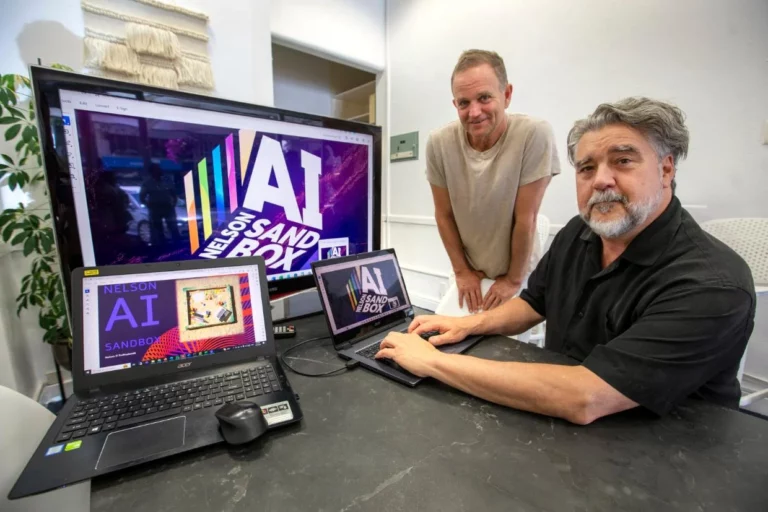
Non-profits enhance services through community AI hub
Not-for-profit organisations say they are saving time and money – helping serve their communities in times of high need – after taking part in a free local artificial intelligence (AI) initiative.
Executive Director of Y-Nelson, Sean Trengrove said the charity had implemented AI tools to help with things like drafting reports and communications, seeing the tasks completed in significantly less time.
Team members were also discovering new ways to express their ideas through the tools, including ChatGPT and Fireflies, and to explore innovative approaches to problem-solving and work more independently, he said.
“That … has allowed staff to focus more on direct engagement.
“The impact is evident in stronger relationships and improved experiences for the young people and families they serve.”
Y-Nelson comprised an early childhood education (ECE) centre, a youth training centre, and after school and school holiday programmes.
Staff were using the new technology after members attended workshops hosted by the Nelson AI Sandbox (NAIS) – itself a non-profit, staffed by volunteers – set up in 2023 to help community members understand AI and use it to their benefit.
ECE teachers at Y-Nelson were using the AI tools to assist with lesson planning or brainstorming activities with children, while school holiday programme workers were using it to look at how they could create innovative activities, Trengrove said.
That gave them more “headspace” to do their jobs, which in some cases had become more demanding, he said.
“There’s increasing pressure because of the general impact in the community around the current economic situation, which flows through to behavioural type issues and so on.”
Local outdoor education provider, Whenua Iti Outdoors, said conservatively, AI implementation had saved the organisation about $20,000 a year.
The trust said it had started trialling ChatGPT and Microsoft Copilot following participation in NAIS workshops, which had helped streamline operational administration and refined internal policies.
The technology often fully resolved system-related issues without the need for external intervention, avoiding substantial time and financial costs, the trust said.
When external support remained necessary, the clarity provided by AI significantly reduced resolution times and costs, it said.
“Tasks that once took hours now take minutes,” systems improvement leader, Geraldine Stones said.
“I’ve saved around $150 an hour on coding and process solutions that I previously would’ve needed to outsource to external contractors.“
The trust said efficiencies from the use of AI had allowed it to redirect more resources to frontline services, enhancing their capacity to support the community.
NAIS said the organisations were among over 60 non-profits in the Nelson area that had attended its workshops, representing over 30 sectors from housing to conservation.
Around 4500 people had used the pilot programme’s services, through dropping into the hub – co-located at the Mahitahi Colab at NMIT in Nelson and at the city’s Elma Turner library – and taking part in events.
NAIS was developed in partnership with Rātā Foundation, the South Island’s leading community investment fund.
Head of community investment, Kate Sclater, said AI had the potential to transform the not-for profit sector by enhancing data analysis, improving decision-making, and automating routine tasks.
“The programme provides practical tools and skills for organisations to integrate AI into their day-to-day operations, regardless of limited resources or financial constraints.
“AI readiness is a key way we can support and empower organisations to build their capability, enhance their resilience and innovate in response to the changing environment.”
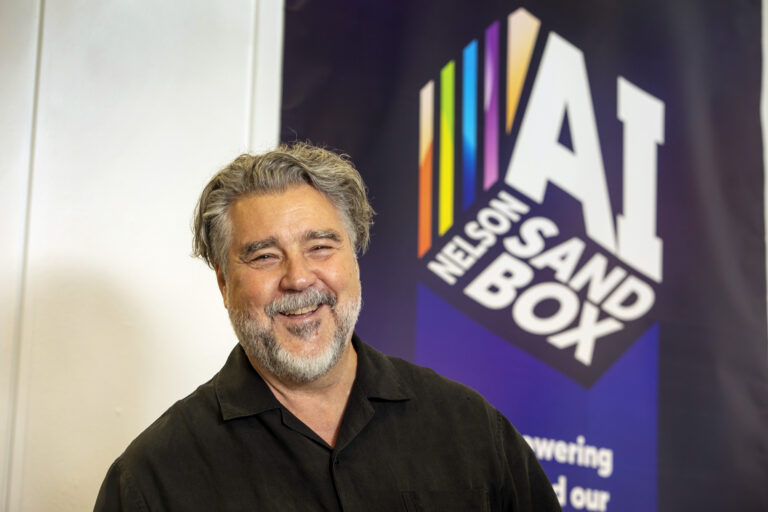
Richard Brudvik-Lindner, co-founder, Nelson AI Sandbox. [Image: Tim Cuff]
The store is the Nelson AI Sandbox – a community education hub where anyone can walk in off the street to experience free, guided, hands-on learning about the latest global AI tools and applications in comfortable surroundings with assistance from a team of local experts.
“I like to think of it as a public library for AI,” says co-founder and chief enthusiast at the Sandbox, Richard Brudvik-Lindner, who is also a teacher at Nelson College and has an impressive career history working in technology innovation and communication.
“As far as we’ve been able to unearth, nobody else in the world has created a free community space solely for educating, empowering and helping the public adapt to the AI world. There are plenty of people out there offering similar components for sale, but having a free shop-front space like this is a world-first,” he says.
Since launching in March 2024, the Nelson AI Sandbox has grown a strong public profile offering personal consultations, free public presentations and workshops, and group tutorial sessions about the promise and perils of AI, including a recent event attended by around 140 locals.
One of the friendly faces that greets you as you enter the Sandbox is Liam Goodger, a former student of Richard’s. Liam finished high school in 2023 and is heading to university later this year to study computer science but works at the Sandbox full-time for now.
“There are two ways to engage with the Sandbox. You either schedule an appointment with me, or you just walk in and ask what you want to know about AI,” says Liam.
“We pay for a range of AI tools that we have on laptops to show people what they can do, what they’re not good for, and how to use them. We also offer general advice, especially about the risks and concerns that many people have about AI.”
Since opening, Liam says they average around a dozen sessions every day either for individuals, businesses, or walk-in enquiries – and have reached about 6,000 people in the five months the Sandbox has been open.
“When we started, we were featured in the local newspaper a few times. We’ve also been active on our social media channels and are reaching out to businesses inviting them to come in, while asking people to spread the word, making sure they know about us.”
“Most people stay for around 45 minutes, and at times it does get quite busy, so we’ve been very happy with the uptake. There’s clearly a lot of interest, with some people returning for a second, third or fourth visit. The word is really starting to spread,” he says.
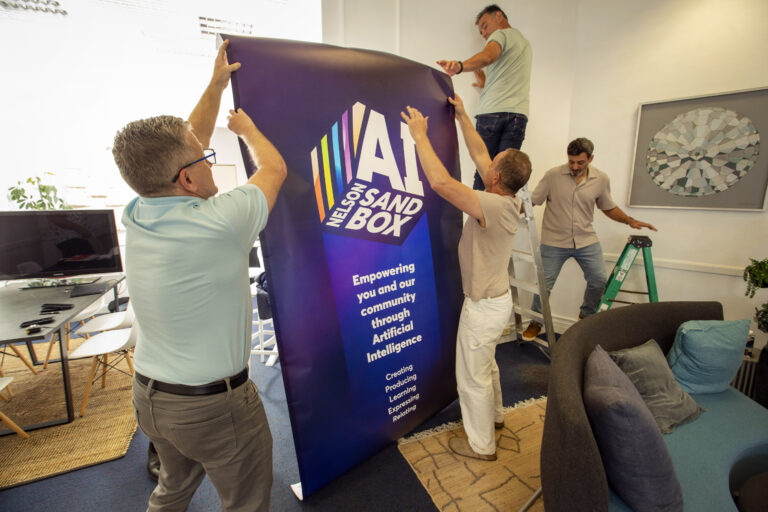
The Nelson AI Sandbox founding team sets up for the grand opening (L-R: J Norness, Matt Kidson, Richard Butler, Ali Kahwaji). [Photo: Tim Cuff]
So how did the globally unique space find an unlikely home in the heart of New Zealand’s second-oldest city? It all started with an idea of Richard’s, following the launch of ChatGPT in November 2022.
A former PR manager for Microsoft in the US, Richard moved his family to the Nelson suburb of Golden Bay in the late 1990s following growing disillusionment with his highly stressful job, a long daily commute, and the desire for a higher quality of life for his young children.
Before leaving the US, Richard retrained as a high school teacher and got a job soon after he arrived in Nelson. While he loved his new career, Richard maintained a deep interest in global technology trends.
“I worked at Microsoft at a transformational time for computing with the launch of Windows 95 and seeing the PC become a consumer device. This was soon followed by the Internet tidal wave that caused an even greater transformation to all our lives,” he says.
“Then, in late 2022, I saw what was happening with ChatGPT and realised that the world would soon be riding a similar wave with AI, but even more so.
“As I talked with people in Nelson about this, we started to think about how we could create something that allowed our community to not only adapt to AI, but embrace it, and be enabled by it, in a way that could put us ahead of other cities in New Zealand and be transformational for our economy.”
One person that Richard spoke to was Mark Houghton-Brown, one of the two founders of the Nelson AI Institute, a venture capital studio for artificial intelligence founded in 2019 with a loan from the Provincial Growth Fund.
“We thought if we could create an unintimidating place with a storefront, where anyone in the community could come in and get some hands-on experience with AI tools, we could ultimately build the knowledge economy in Nelson and also help reactivate the CBD.”
After a few months of careful planning and hard work by volunteers setting up the space near the city’s Saturday market, the Nelson AI Sandbox launched with a grand opening that welcomed the public, politicians and community leaders alike.
“We now have a group of about 20 volunteers of all ages helping run the place. Our aspiration is to eventually be open from 11.00am until 2.00am, seven days a week, and welcome people aged anywhere from seven to 77,” says Richard.
“It’s intentionally an intergenerational space. We want young and old people interacting here, because we have many elderly people in Nelson who can often feel shut out of technology. This is why it doesn’t look like an office or a commercial enterprise. We want it to be approachable and inviting, so that everybody feels welcome here.”
However, Richard’s ambitions for the Sandbox stretch much wider than just education on AI.
“This is all about maintaining the high quality of life that we have here in Nelson. That’s a big, important part of what we’re trying to do with the Sandbox,” he says.
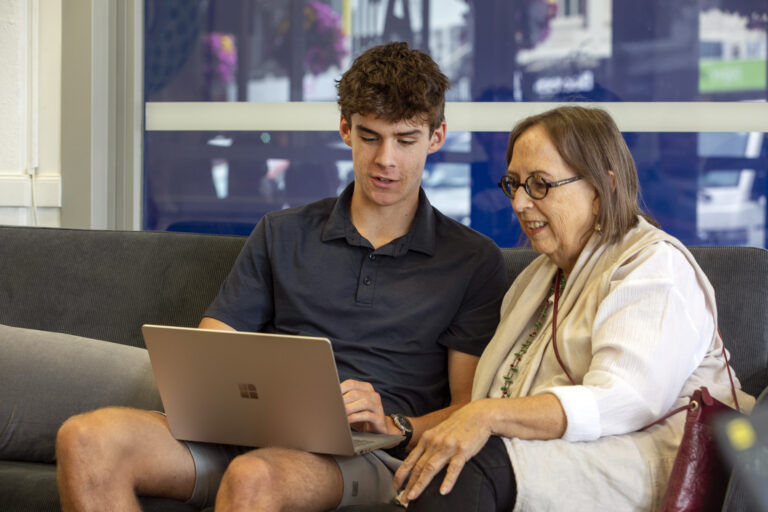
Nelson AI Sandbox project coordinator Liam Goodger (left) guiding Nelson local Iliana Anderson’s use of AI. [Photo: Tim Cuff]
“Nelson is a truly beautiful place, but we have an ever-growing number of people over 65 and a declining number of people under 16. We also have the highest number of scientists and researchers per capita in New Zealand, and a lot of people with PhDs – but we’re also second lowest in productivity in the nation.
“As a result, we have the lowest economic growth forecast in the country right now – so we believe helping the people of Nelson understand and utilise AI will, in turn, help address some of these challenges.
“Nelson is wedged on a relatively narrow strip of land between the sea and the hills. We have lots of extractive industries, such as forestry, fishing and farming – things that are very land intensive or natural resources intensive.
“Because we have so many smart and capable people in this community, we’re focused on doing more than just being an extractive economy. Building an innovation economy – a knowledge economy – makes a lot of sense for Nelson,” says Richard.
Although officially a subsidiary of the Nelson AI Institute, initial funding for the Sandbox came from Shuttlerock, a digital creative company headquartered in Nelson.
“Our next big funder was Ngāti Kuia, and, perhaps surprisingly, Spa World, the biggest spa company in Australasia, which also has a Nelson-based HQ. As a company, they have really embraced AI, so wanted to help us out.”
In total, 30 companies, including non-profits, schools and local government entities, signed up as supporters.
“We took the initiative ourselves to set this up. We didn’t wait for government, or anyone, for that matter. We scrubbed up, painted the space ourselves and made something from scratch. Basically, we’re flying the plane while we’re building it, with that whole startup mentality. That’s how we’ve always operated.”
Today, the Sandbox is looking for more grants, having received some funding from Spark and Techstep, funded from MBIE.
“This is our pilot phase, but if we can secure more funding, we hope to be in operation for a full year by February 2025,” says Richard.
“We’ve had a lot of generous in-kind donations too. Our storefront space is rent-free, for example, and all the furniture is provided by home staging company, Open Home Ready.”
With the Sandbox now well-established in the CBD, Richard and his team are planning on adding bespoke AI training for industry to their service offering, as well as workshops on ethical use of AI and avoiding AI scams.
“These things are especially important for older people, who may find technology confusing. There are dangers with AI, of course, but there are also real opportunities. We want to maximise the positive things that come out of utilising AI in our own little sphere, while minimising the negatives,” he says.
“Our main goal is to empower the community. AI is happening worldwide, and we want Nelsonsians to be able to capitalise on this – for the prosperity of all.”
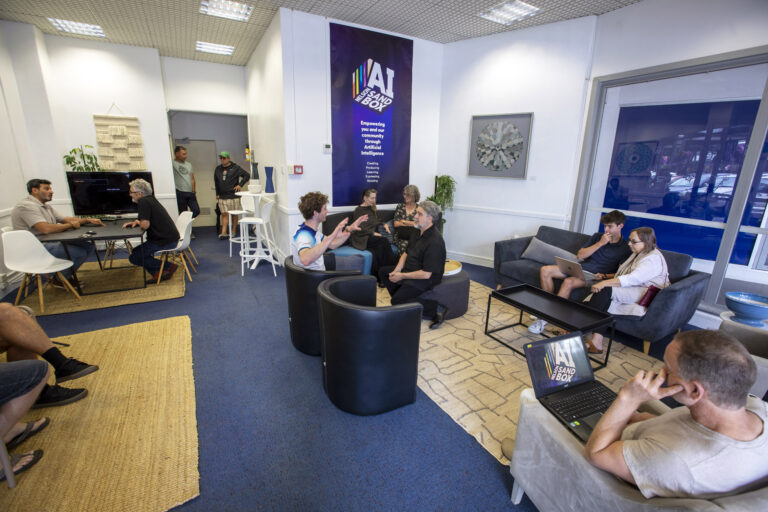
One of the things the AI Sand Box can offer is the use of paid AI tools which pricing may be out of reach for the everyday consumer. Photo: Supplied.& nbsp;
Today marks the opening of a globally ground-breaking project, the Nelson AI (Artificial Intelligence) Sandbox, which is set to educate, empower and adapt the community of Nelson-Tasman through AI.
The AI Sandbox has been created as a not-for-profit subsidiary of the Nelson AI Insitute and is open as a store-front discovery space in the Nelson CBD. The Sandbox, located on Trafalgar Street, will act as an inclusive space where all members of the community can drop in to gain safe, free access to AI tools and hands-on expertise.
A not-for-profit entity, and a completely community-led effort, the space is run through the efforts of 20-30 volunteers and one employee, including 12 AI experts and enthusiasts, some associated with the Nelson AI Institute.
AI Sandbox founding team member, Richard Brudvik-Lindner says the space is the first-of-its-kind in the world, as far as they have found.
“There is a pressing need for New Zealand communities to fully understand, explore, and cultivate the many opportunities AI presents and to use these skills to innovate and future-proof. AI is here, and that can be a good thing, but we know many people are a bit wary of it.
“We’ve developed the AI Sandbox to de-mystify AI and foster a more confident, eyes-wide-open and innovative attitude to using it. The overall aim is to make the Nelson Tasman region of 115,000 people, a more prosperous, equitable and connected place by building community capacity – upskilling residents.”
Richard says he hopes that Nelson can be seen as a cornerstone of the New Zealand AI market, as a place where the industry can create opportunity.
“The thing for us is trying to democratize this technology.
“We’re not going to solve that (the problems with AI) here in Nelson, but we’ll have it and what do you do with it.
“How can you be empowered through this technology to enhance your lives. Imagine an entire community with that, what it would do.”
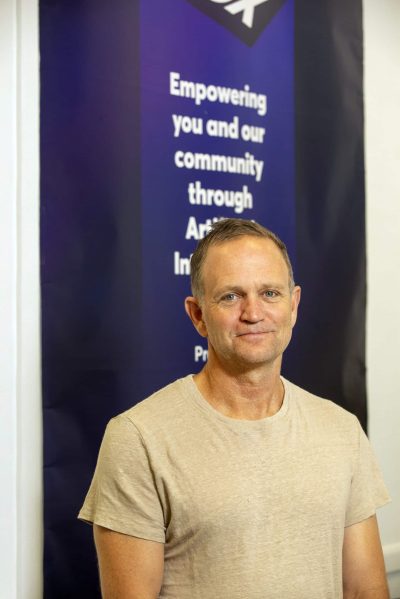
AI Sandbox founding team member Matt Kidson wants the space to foster a wider-community around AI to enhance their lives. Photo: Supplied.
The opening comes at a critical time for AI adoption, says AI Sandbox co-founder Mark Houghton-Brown.
“It’s becoming clear that AI is a rapidly evolving, transformational technology that is inevitably changing our lives, but the breadth of its potential is still unclear.
“If we can understand and make full use of the rapidly developing suites of AI tools available to us, then we will be better equipped to participate in the economy of the future, and to help shape it rather than simply consume it.”
In a survey conducted by the NZ AI Forum, 44 per cent of respondents identified education as a key barrier to AI adoption so in a bid to counter these existing barriers to entry the AI Sandbox will offer both drop-in and scheduled visits.
Richard describes the Sandbox as “an intergenerational space that strengthens the community’s social fabric, as it targets capacity-building and community-creation for all ages and all socio-economic strata.”
It will operate on three levels to cater to all needs and levels of experience:
1. A self-discovery space for those with some confidence with AI where they can access various AI tools, engines, plug-ins, and apps and develop their skills, and have peer-to-peer interactions – educating each other about AI.
2. A curated service, where experts create a sequence of AI explorations – so beginners can develop confidence in AI guided by experts and enthusiasts.
3. A tutorial space for bespoke workshops designed for groups who want to learn to use AI for specific purposes.
Ultimately the Nelson AI Sandbox will also add AI adaptability services, helping the community adjust to the rapid pace of change likely to happen through AI.
The Nelson AI Sandbox’s wider ambitions include future programmes relating to local schools, Māori facilitation alongside iwi partners, business outreach, creative community access and local government initiatives.
AI Sandbox co-founder Matthew Kidson emphasised the vast opportunities the AI Sandbox would provide the community.
“This initiative is not limited to economic endeavors, there are endless areas of opportunity where AI can provide value, including in the arts, within non-profit organisations and for the elderly population.
“AI can help extend human potential in all areas and learning to harness this potential will help Nelson to prosper now and in the future. Come on down Nelson – the Sandbox is open for you.”
The inclusive and collaborative space will be open to all from 10 AM, on the 9th of March at 228 Trafalgar Street, Nelson.

